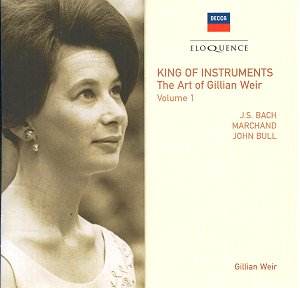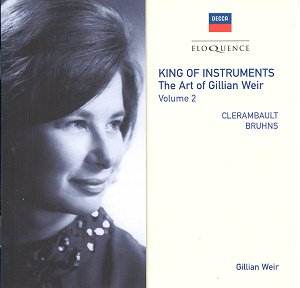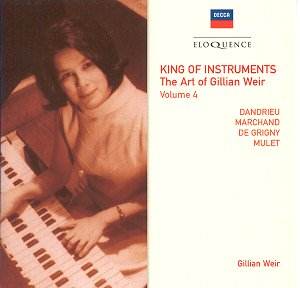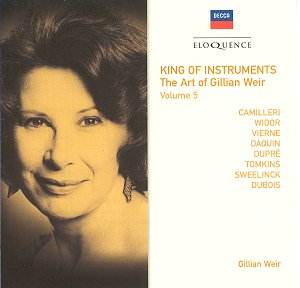AVAILABILITY
buywell.com
The contribution made
to the world of the organ by Dame Gillian
Weir is almost incalculable. Our instrument
has hardly had such a skilled ambassador
in modern times - not just as a remarkable
performer, but also through her radio
and television appearances, and her
many recordings. It is therefore interesting
to reflect on these recordings, made
mostly around thirty years ago, and
containing predominantly baroque music.
Gillian Weir notes in volume 1 that
the recordings will be seen in context.
This is of course true, but even if
many attitudes towards performance of
some of this music have changed, it
is fascinating to consider the impact
they must have had.
Weir’s teaching and
performing of much of the music here
shaped, in a sense, the attitude of
a whole generation of British organists
toward early repertoire. Its not hard
to see why in those days, when Britain
was still under the heady spell of the
first wave of reformists, (both players
and organ builders) why her playing
of pre-1750 literature, much of it then
little known compared to the situation
today, was so inspirational. Her Bruhns
for instance on Volume 2 is remarkable
for its sheer sense of drama, even if
elements such as organ choice, tempo
relationships, rhetoric and registration
are now considered within different
parameters. It should be remembered
that Gillian Weir was an ambassador
in Britain for reformist thinking abroad;
perhaps her most inspirational mentor
was the redoubtable Anton Heiller.
One area where changing
tastes have in no way diminished Weir’s
recorded achievements is in the area
of French Classical music. "French
Classical music is my passion"
she writes in Volume 4. Her atmospheric,
dramatic and intense readings have stood
the test of time remarkably well. Perhaps
my favourite example is her recording
of the Fugues and Caprices of Roberday
on Volume 3. What an astonishing body
of work this is, all but unknown to
me I am ashamed to say, and the composer’s
only surviving opus, published in 1660.
Weir plays here on the marvellous sounding
1718 Andreas Silbermann organ in the
Leonhardkirche in Basel. Her admission
that "I spent an evening playing
through a pile of little-known music
I had brought alone ..... and decided
to record it then and there" is
scarcely believable, these are among
the most profound recordings of the
whole series. Her Clérambault
on Volume 2 is perhaps a close second
– Weir plays the same organ.
Another area where
Gillian Weir has surpassed her British
colleagues is in the championing of
unpopular 20th century literature.
She famously won the St Albans competition
in 1964 playing Messiaen at a time when
Messiaen was, in the UK at least not
mainstream organ repertoire. Perhaps
the most important recording here then
is her performance of the Maltese composer,
Charles Camilleri’s Missa Mundi, (Volume
5). What a terrifying work this is,
with extended fortissimo atonal repeated
chordal passages, Messiaenic monophony
contrasting with the stillness of the
concluding ‘Prayer’. This work was composed
in 1972 and, it must be said, has never
really caught on. In fact I know of
just one other recording, perhaps inevitably
by the completist’s completist, Kevin
Bowyer. Did Dame Gillian in a sense
back the wrong horse? I think actually,
whatever one’s feeling about the piece,
and it is an acquired taste, that the
demands made on the player are simply
too extreme for all but a handful of
organists to take on. Weir’s incredibly
virtuosic playing here, in the ultra-dry
Royal Festival Hall reminds us that
she came to Britain from her native
New Zealand in the first instance to
study piano. It is fitting therefore
that this has been re-issued.
In terms of mainstream
repertoire, certain performances, mostly
of French music remain, more or less,
cutting edge. The dazzling Dubois, Vierne,
Mulet and especially Dupré have
scarcely, if ever been beaten. Perhaps
this is the literature for which Gillian
Weir will be most remembered by players
and listeners of future generations.
I can’t help feeling though, as a result
of my hypothesis, that the present recordings
therefore, with their focus on pre-1750
literature, don’t necessarily represent
the very best of Weir’s recorded oeuvre.
Her complete Messiaen cycle for instance
has, for my money, never been bettered,
even by the spectacular Latry/Notre
Dame combination on DG. I am also a
huge admirer of her Franck recordings;
she captures an other-worldliness in
his music which few others manage, but
never falls into the category who would
seek, in the footsteps of Tournemire,
to re-incarnate a fantastical Père
Angélique through sentimental,
slow and often boring interpretations.
The organs featured
on the present discs make up an interesting
collection. In terms of the baroque
and pre-baroque repertoire at least,
they are symptomatic of a previous generation
of players and ideals. Some, like that
already mentioned in Basel, are fabulous
and play the part well. Others are now
seen in a different, not necessarily
negative, but certainly contextual light.
The sterile Marcussen in Rotterdam,
strikes me, even in 1977, as a curious
choice for the Bach, (volume 1). Yes,
it was brand spanking new, and then
the biggest organ in the Netherlands.
But just 20 minutes away on the train
is a far more beautiful example of that
generation of organ building, the Metzler
in the Grote Kerk in The Hague. Playing
on a modern instrument in the Netherlands
at all is curious given the 900-odd
historical organs to be found throughout
the land. Interestingly Gillian Weir’s
most recent Bach recording is on a historical
reconstruction in Leipzig. The Beckerath
organ in Cambridge, (Bruhns volume 2,
Scheidt volume 3), is of a better quality
than the Rotterdam organ, but the equal
temperament and rock-steady wind again
become tiring on the ear after a while.
The organ of Hexham Abbey, designed
and built by Weir’s late husband, is
used in a huge variety of contexts,
from Bull to Widor; again the temperament
and wind issues in Cambridge work against
the early music, and the high mixtures
work against the Widor.
But probably I’m missing
the point. Gillian Weir’s musical ideals
of the time are tied up with her views
of the instruments. One should bear
this in mind I think, and revel in these
re-issues for what they are, a portrait
of a hugely influential artist at a
certain period in her career.
Some gripes must be
aired. Firstly, what a shame that Gillian
Weir herself didn’t contribute more
of the liner notes, she is so eloquent!
Mr RJ Stove writes adequate notes but
these contain such inaccuracies as "pedals
were not nearly so common [in the mid
18th century] in France as
in….England or Italy". Ouch. Secondly,
there is nothing at all about the organs.
A photo of the astonishing Thionville
case at least should have been included
together with some histories and stop-lists.
Thirdly the weird composition of the
discs that has two of them consisting
of 95 % baroque music with one track
of 20th century French repertoire
used as a filler.
I would recommend especially
Volume 2 for the Clérambault,
3 for the Roberday, and 5 for the Camilleri
and the deliciously played French miniatures
from Hexham.
Chris Bragg





